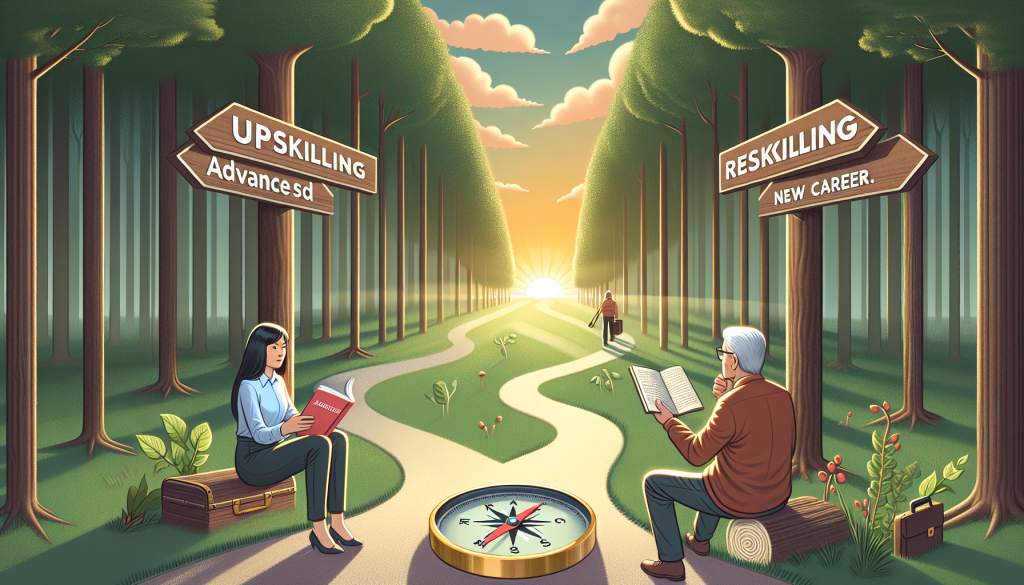
Upskilling vs. Reskilling: Which Path Is Right for Your Career?
Upskilling vs. Reskilling: Which Path Is Right for Your Career?
The world of work is constantly changing, and keeping up with the latest trends and technologies is crucial for career growth and success. With the rise of automation and the increasing demand for specialized skills in the job market, the traditional approach of sticking to one career path for life is becoming obsolete. In this fast-paced digital era, professionals need to continuously learn and adapt to stay relevant in their fields. But which path is the best for advancing your career – upskilling or reskilling? In this article, we’ll explore the differences between upskilling and reskilling and help you determine the right path for your career.
What is Upskilling?
Upskilling refers to the process of acquiring new skills or expanding existing ones to stay relevant and competitive in your current role or field. It involves learning new tools, technologies, or techniques to improve your performance and add value to your organization. Upskilling is a continuous process that can help you advance in your career and take on more challenging roles within your field.
What is Reskilling?
Reskilling, on the other hand, involves acquiring a completely new set of skills to pursue a different career path. It typically involves learning new skills unrelated to your current role or field. Reskilling may be necessary if your current job is at risk of being replaced by automation or if you want to explore new opportunities in a different field.
Upskilling vs. Reskilling: Key Differences
The main difference between upskilling and reskilling is the level of change they bring to your career. While upskilling allows you to build upon your existing skills, reskilling requires a complete transformation of your skill set. Here are some other key differences:
- Time Commitment: Upskilling is a continuous process that can be done while working, and the time required may vary depending on the complexity of the new skill being learned. On the other hand, reskilling may require a more significant time commitment, including taking a break from work to undergo training.
- Cost: Upskilling can be relatively inexpensive, with many online courses and resources available for free. Reskilling, on the other hand, may involve investing in a formal education or training program, which can be more costly but may lead to better job prospects.
- Career Advancement: Upskilling can help you advance within your current career path, while reskilling can open up new career opportunities and paths.
Which Path Is Right for You?
Deciding between upskilling and reskilling ultimately depends on your career goals and personal circumstances. If you’re happy with your current career path but want to enhance your skills and keep up with industry changes, upskilling is the way to go. However, if you feel stagnant in your current role or want to explore new opportunities in a different field, reskilling may be the right choice for you.
If you’re unsure which path to take, here are some factors to consider:
- Your Interests: Your interests and passions should be a crucial factor when deciding on a career path. If you’re genuinely interested in a particular field or skill, it’s more likely that you’ll be motivated to learn and excel in it.
- Market Demand: Reskilling may be a good option if there’s a high demand for a particular skill in the job market, while upskilling can help you differentiate yourself and stand out in a competitive market.
- Your Current Job: If you’re satisfied in your current job but want to progress within your organization or field, upskilling is a better fit. However, if your current job is at risk of being replaced by automation or if you’re feeling unfulfilled, reskilling can provide you with new opportunities and job satisfaction.
The Importance of Google SEO
No matter which path you choose, showcasing your skills and expertise to potential employers is crucial in today’s digital job market. And that’s where Google SEO comes into play. By optimizing your online presence and using the right keywords, you can increase your visibility and attract the attention of recruiters and hiring managers. Keep in mind specific SEO practices while creating your resume, LinkedIn profile, and other online platforms to ensure you’re easily found by relevant employers.
In Conclusion
Both upskilling and reskilling can be beneficial for your career growth and success. The key is to continuously learn and adapt to stay relevant in the ever-changing world of work. Choose the path that aligns with your goals, interests, and market demand, and don’t forget to leverage Google SEO to stand out in the competitive job market.
Whether you decide to enhance your skills through upskilling or embark on a new journey with reskilling, always remember that learning is a continuous process, and investing in yourself will always pay off in the long run.
For more career advice and tips, stay tuned to our blog!
